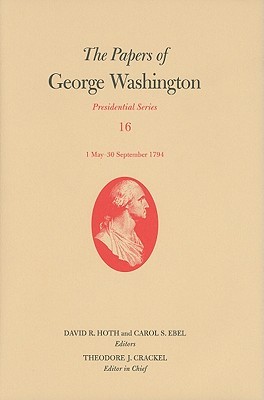- Bible
- Read the Bible
- Bible Versions
- Verse of the Day
- Reading Plans
- Verses by Topic
- Books of the Bible
- Bible Images
- Study
- Commentaries
- Concordances
- Dictionaries
- Encyclopedias
- Sermons
- Bible Atlas & Maps
- BP Wiki
- Devotionals
- Today's Devotionals
- Light of the World
- All Devotionals
- Inspirational Quotes
- More
- Picture Quotes
- Videos
- Inspirational
- Bible Study
- What The Bible Says
- Bible Q&As
- Daily Bread
- Bible by Genre
- Bible Stories
- Random Bible Verse
- Community
- Store
The Papers of George Washington, Presidential Series, Volume 16
by George Washington
During the spring and summer of 1794, Washington and his cabinet faced concerns that arose from the ongoing war in Europe. Embargo evasions, activities of French and British privateers, and the formation of a league of armed neutrality by Denmark and Sweden required appropriate administrative responses. Fears persisted about a potential war with Great Britain, even as John Jay began negotiations as envoy extraordinary to that nation.
Issues on the frontier included an attempt by Elijah Clarke of Georgia to establish an independent government on Creek Indian lands, unrest in Kentucky arising from the slow progress of negotiations with Spain about free navigation of the Mississippi River, concerns that the British were encouraging Indian hostility toward the United States, and the need to strengthen Gen. Anthony Wayne's army for his forthcoming Indian campaign.
All other issues were dwarfed in early August when events in western Pennsylvania brought a long-simmering opposition against the excise tax on whiskey to (as Washington saw it) open rebellion. When conciliatory efforts failed, preparations to call up the militia from Pennsylvania, New Jersey, Maryland, and Virginia moved forward in full force. Washington left Philadelphia to join the troops on September 30, the same day that first reports of Wayne's victory at the Battle of Fallen Timbers reached the city.
Despite these concerns, Washington remained attentive to the management of Mount Vernon, primarily through weekly correspondence with farm manager William Pearce. He also sought to sell his western lands, but the Whiskey Insurrection suspended much of his efforts.
Issues on the frontier included an attempt by Elijah Clarke of Georgia to establish an independent government on Creek Indian lands, unrest in Kentucky arising from the slow progress of negotiations with Spain about free navigation of the Mississippi River, concerns that the British were encouraging Indian hostility toward the United States, and the need to strengthen Gen. Anthony Wayne's army for his forthcoming Indian campaign.
All other issues were dwarfed in early August when events in western Pennsylvania brought a long-simmering opposition against the excise tax on whiskey to (as Washington saw it) open rebellion. When conciliatory efforts failed, preparations to call up the militia from Pennsylvania, New Jersey, Maryland, and Virginia moved forward in full force. Washington left Philadelphia to join the troops on September 30, the same day that first reports of Wayne's victory at the Battle of Fallen Timbers reached the city.
Despite these concerns, Washington remained attentive to the management of Mount Vernon, primarily through weekly correspondence with farm manager William Pearce. He also sought to sell his western lands, but the Whiskey Insurrection suspended much of his efforts.
BUY NOW
Hardcover, 856 pages
Published March 24th 2011 by University of Virginia Press
© 2025 Bibleportal.com All rights reserved.

George Washington was the commander of the Continental Army in the American Revolutionary War (1775-1783) and served as the first President of the United States of America (1789-1797). For his central role in the formation of the United States, he is often referred to as the father of his country.
Washington was baptized into the Church of England. In 1765, when the Church of England was still the state religion, he served on the vestry (lay council) for his local church. Throughout his life, he spoke of the value of righteousness, and of seeking and offering thanks for the "blessings of Heaven."
The Electoral College elected Washington unanimously in 1789, and again in the 1792 election; he remains the only president to receive 100% of the electoral votes.
Washington proved an able administrator. An excellent delegator and judge of talent and character, he held regular cabinet meetings to debate issues before making a final decision. In handling routine tasks, he was "systematic, orderly, energetic, solicitous of the opinion of others but decisive, intent upon general goals and the consistency of particular actions with them.
Washington died in 1799. He has been consistently ranked by scholars as one of the greatest U.S. Presidents.
... Show more